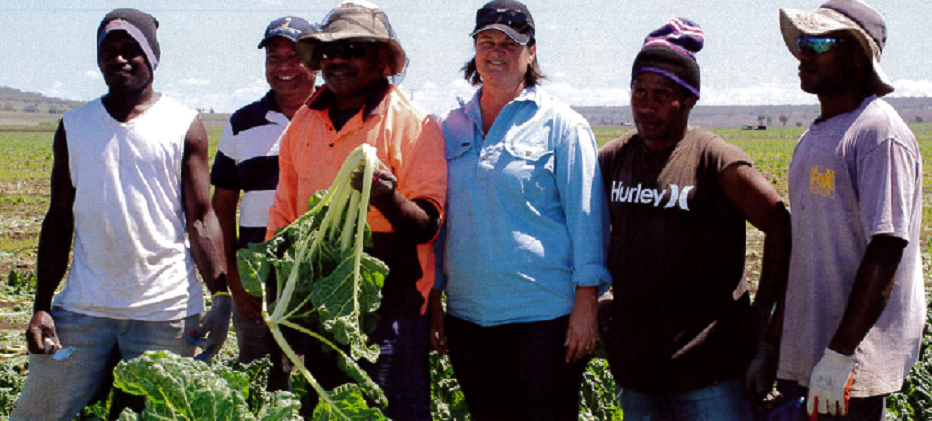Six years into their tree change, Kerry and Simon McCarthy made a leap of faith in hiring their first employee through the Seasonal Worker Programme.
Five years on, they now employ nine men from the Solomon Islands in addition to two local workers, and couldn’t be happier with their team.
Early on the McCarthy’s found the local workforce to be unreliable.
“If it’s too cold or too wet, they won’t turn up,” Kerry said. ”But we’ve still got to pick and pack everything with daily orders to fill. The weather makes no difference to us; if we’ve got it, it’s got to go.”
Eleven years ago, when Simon announced that he wanted to be a fulltime vegetable grower, the couple left behind their Samford property and their small veggie patch to move to a property in Mt Molar on the Darling Downs. Determining the soil’s suitability for growing leafy greens, they began farming silverbeet and kale.
It was at an Ausveg National Convention that they discovered the Seasonal Worker Programme. The McCarthy’s realized that they could circumvent the problems of a local labour shortage as well as avoid the high cost and high turnover of employing backpackers who require all the usual aspects of training and only provide minimal, short-term return on investment.
For fifteen years, Kerry worked for Qantas and Simon worked for Quarantine. They attribute their initial receptiveness to the programme to their respective professional backgrounds.
“The whole visa thing and foreign workers didn’t scare us at all,” she said.
The Seasonal Worker Programme creates a bridge between the staffing requirements of horticulture employers and the need for employment opportunities within nine participating Pacific Island countries and Timor-Leste.
It was the Seasonal Workers Programme that has allowed for Gracekate Farms to embrace a level of productivity that had previously been inconceivable.
The workers employed by Gracekate Farms under the Seasonal Worker Programme are from the Solomon Islands.
“Our boys come from an isolated jungle village in the Solomon Islands where there is no road access. They arrive on our farm super-fit and are already used to bloody hard work. That’s half the battle,” Kerry said.
“They arrive motivated and ready to work for the season. They show commitment and take responsibility for doing a good job. They are a consistently reliable labour source and will not leave you half way through the growing season.”
Additionally, the men working on Kerry and Simon’s farm are related in one way or another.
Honour is an important aspect of the Solomon Islands’ culture. To be sent back, having made a poor impression, would affect not just an employee’s own reputation but also that of his family and village.
Kerry believes there are a couple of things that could be tweaked with regards to the organizational process behind the Seasonal Worker Programme.
“The Seasonal Worker Programme team in Canberra, which falls under the Department of Employment and Department of Immigration, are continuously trying to improve the program so it is consistently evolving,” she said.
“In five to ten years time the size of this program is going to be staggering and I encourage any horticulture employer who is experiencing labour shortages to look closely at getting involved now.”
Kerry acknowledged that the whole process to become an approved employer is quite lengthy, however the Seasonal Worker Programme team can help growers through the process.
“The Queensland Government has also appointed a contact person to help you through the process,” she added.
Based in Brisbane, program coordinator Ali Ume covers the whole of Queensland. Mr Ume can be contacted via email: This email address is being protected from spambots. You need JavaScript enabled to view it.
“There are so many illegal workers in this industry who are not being paid legal wages that the onus is now on the farmer to check all workers on their property are legitimate,” Kerry said.
“It’s not worth the risk. This programme helps you plan ahead for the next season knowing you are going to have someone there to pick the crop.”
When the McCarthy’s went to visit the Solomon Islands, they noted that the effect of the money wasn’t just felt in their employees’ immediate family circles.
“They’re going home with cash to inject into their own economy. It’s a flow-on effect,” Kerry said.
“When they leave their village, they pay other locals to do the things they are unable to tend to. They are employing other people. They’re not just lining their own pockets; they’re helping other families.
“It’s a win-win situation. We have workers that return to us each season that are already trained and are also highly skilled. The workers are committed, they are in Australia only to work to better their families’ lives. We trust them and we can rely on them.”
As a direct result of their participation in the programme, the McCarthy’s have expanded their business.
“We have the confidence to expand our business because we now have a reliable, skilled and dedicated workforce that can help us make each season a success,” Kerry said.
- Ebony Graveur

